| item(s), Total: $0.00 View Cart |
| Shopping cart is empty. |
At GLSC this month, we've been busy; just last week we had our NASAA Audit (for our organic certification) and we're pleased to report it all went well. It's great to see the organic movement growing, with more companies coming on board with various products. GLSC received the first certification for our vegie mix & vegie concentrate in 2008 (the first soil yard in Perth to do so) - and our certified stable now has 11 products; our Premium Potting Mix, Vegie Mix, Vegie Concentrate, Seed Raising Mix, Square Foot Mix, Blood & Bone, Charlie Charcoal, Cassies Clay, Rocky Rock Dust, Blueberry Mix and Sand Remedy.
Did anybody notice the HUGE amount of Hoverflies that were active all over Perth a few weeks ago? Interesting to see them in such numbers this year - nobody's quite sure why! An anecdotal explanation I heard was that their numbers exploded in response to aphid numbers on canola crops. Interesting theory. Hoverflies are good guys - not only are they harmless pollinators, some species have insectivorous larvae - who devour aphids, thrips etc. So yet another reason not to reach for broad spectrum pesticides in your garden & do the least harm possible! It's Australian Pollinator week; so good to be mindful of the multitude of good (and neutral) bugs who inhabit our gardens. I'm writing this in the middle of NAIDOC week, and am reminded that in local Noongyar tradition, it is Kambarang season - the time of year that the weather warms, native orchids, kangaroo paws and balgas are flowering; snakes are on the move, and soon the Australian Christmas Tree Nuytsia floribunda or "Mooja" will be flowering. These trees are incredibly significant to the Noongyar people who regard them as sacred and "off limits" - spirits of the dead 'camped' in the branches and flowers of the tree, in preparedness for their final journey across the sea to the spiritual world of the ancestors, and were not to be disturbed. For more reading, check out this link. So we hope this Kambarang season finds you & your garden thriving! (If not - then surely it's time to pay us a visit @ GLSC!)
Linda & the Green Life Soil Co team. Pictured right - the lovely crew from the Darling Scarp Gardening Club who visited us recently! In this newsletter:Jobs for the November garden Jobs for the November garden
What to plant now
Planting seeds NOW will give you later crops - so for maximum benefit, plant a few seedlings to get harvesting early - then plant out your seeds soon for your succession planting and extend your harvest window. (We've also got the biodegradable pots for sale for you to grow your own seedlings - pictured below right.) GLSC has 1L and 5L bottles of Verigrow in stock now. I'm looking forward to trying Verigrow soon! For more information, see their website here. Spring Pests & DiseasesWe're seeing a few people come in with pest and disease issues lately... If you're not sure what pests are doing damage, remember to go out at night with a torch a few times to try to catch the culprit in the act! If it's something you can't ID, use the free Ag Departments 'Mypestguide' app to take a photo and upload it. You'll receive a report from experts who'll help you identify it, and map it to add to the database that everyone can access, so together we can all learn what's out there. Cabbage Moth & Cabbage Butterfly
Tomato Budworm (tomato caterpillar)
Vegetable weevils
Aphids
TPP - Tomato Potato Psyllid
Fruit Fly
Fungal diseases
The best way minimise issues with pests & diseases is to inspect your garden regularly and act quickly before things spread. Good hygiene is important; remove and destroy infected plant material - some bacteria and fungal spores can persist in the soil for years (another reason why crop rotation is important). Use any sprays/treatments judiciously to avoid harming beneficial insects, don't apply in wet or windy conditions. Often very early morning is a good time to apply pest treatments - before it's warmed up when many pests aren't as mobile, and you can spray before the bees arrive. Photo CompetitionCONGRATULATIONS to Lisa Beattie from Middle Swan who has been selected as our November winner for our photo competition. She sent in these pics via Facebook.
She says: "Thankyou Green Life soil, with the help of your vegetable mix my garden is looking awesome this spring! In the 1st photo s cucumber climbing the wire frame, silver beet, spring onion and onions. The 2nd photo is kale beetroot parsley garlic and board beans. The kale I bought from Green Life as seedlings with everything else grown from seed. My husband built the raised gardens in April and we filled them with Greenlife veggie soil mix."
VIP Special Offer
Normal price is $11 each (or 2 for $20) but VIP's who ask for the discount can pick one up at $7.50. Online shoppers - log into the members section to purchase the calendar (and other goodies!) at special prices. Moon planting calendars make great gifts and stocking fillers - so grab one for your friends, family and one for yourself. (As a good friend of mine says - "the back of every toilet door needs one!") Retailer Update
All stockists carry different items - if there's an item of ours they don't usually carry, in most cases they'd be very happy to add it to their next order for you. THANK YOU for being part of the Green Life family - stay safe, stay healthy & keep gardening!
|



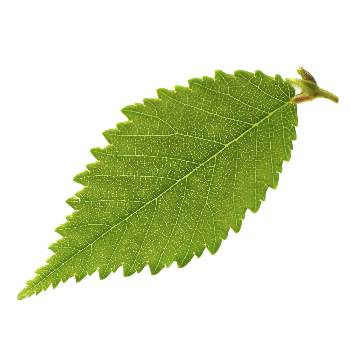 Hello & welcome to NOVEMBER! As we steamroll towards Christmas and Summer and the end of 2020 - what a year it's been... More than ever before our gardens have become places to help us get in touch with nature and its rhythms; and for some, the love of gardening has been ignited for the first time. As I write this, the weather has returned to a Winter-like temperature, and we've received a very nice drop of rain which helps the new plantings along nicely.
Hello & welcome to NOVEMBER! As we steamroll towards Christmas and Summer and the end of 2020 - what a year it's been... More than ever before our gardens have become places to help us get in touch with nature and its rhythms; and for some, the love of gardening has been ignited for the first time. As I write this, the weather has returned to a Winter-like temperature, and we've received a very nice drop of rain which helps the new plantings along nicely. And a big THANK YOU for voting for us in the 2020 Organic Consumer's Choice Awards - we WON the title "ORGANIC SPECIALIST" thanks to receiving the votes from so many of our lovely customers. It's an honour to have such amazing support.
And a big THANK YOU for voting for us in the 2020 Organic Consumer's Choice Awards - we WON the title "ORGANIC SPECIALIST" thanks to receiving the votes from so many of our lovely customers. It's an honour to have such amazing support.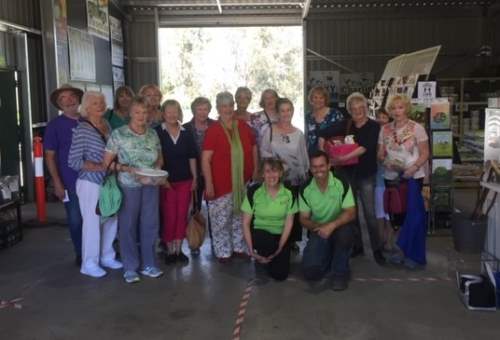 Happy gardening,
Happy gardening,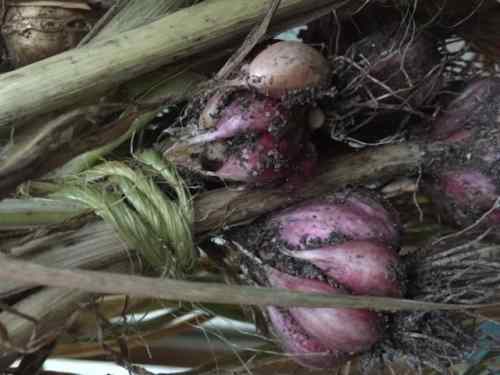 Check your garlic! I've seen lots of posts on social media lately with people sad their garlic hasn't yet formed cloves. The main reason for this is YOU'RE PICKING IT TOO EARLY! Depending on what variety you planted, and when, the tops may well be yellowing and have fallen over. But don't be tempted to rip it all out just yet if it doesn't look like it's formed cloves! (you can still pick & eat if you're desperate for fresh garlic in your cooking). 'Wet garlic' is when the bulbs are picked too soon. They need to dry off a little in the ground; it's this drying off process that allows the papery walls to form between the individual cloves. My guess is that (at least in my garden) it probably needs another 3-4 weeks in the ground. By carefully digging around your garlic (or harvesting one plant) you can gauge where your crop is at.
Check your garlic! I've seen lots of posts on social media lately with people sad their garlic hasn't yet formed cloves. The main reason for this is YOU'RE PICKING IT TOO EARLY! Depending on what variety you planted, and when, the tops may well be yellowing and have fallen over. But don't be tempted to rip it all out just yet if it doesn't look like it's formed cloves! (you can still pick & eat if you're desperate for fresh garlic in your cooking). 'Wet garlic' is when the bulbs are picked too soon. They need to dry off a little in the ground; it's this drying off process that allows the papery walls to form between the individual cloves. My guess is that (at least in my garden) it probably needs another 3-4 weeks in the ground. By carefully digging around your garlic (or harvesting one plant) you can gauge where your crop is at.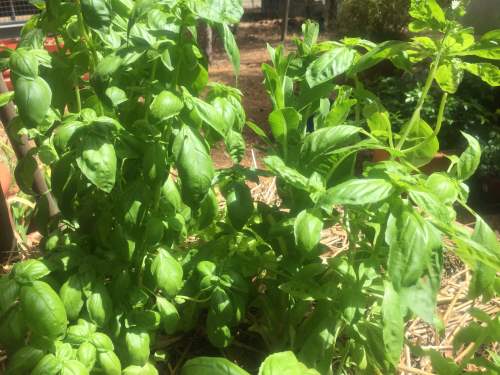 Get your herbs going! Many herbs respond to the warmer weather; plant them into improved soil and water regularly to be enjoying fresh & flavourful herbs for your summer entertaining & Christmas cooking. If you're wanting to give potted herbs (or potted colour) for Christmas gifts - now's the time to select your pot, choose your gift, and pot it up. Look after it and by the time Christmas comes along (spoiler alert - about 6 weeks) it will have settled into its new pot, and be looking lush and lovely - ready to give away. Due to Covid craziness, herb quantities have been a little restricted - but there's more and more availability now that weather is warming and plants are actively growing - we've got a good range in ATM @ GLSC. It's the PERFECT time to plant Basil (pictured right) - fabulous companion plant and flavour partner to your tomato crop.
Get your herbs going! Many herbs respond to the warmer weather; plant them into improved soil and water regularly to be enjoying fresh & flavourful herbs for your summer entertaining & Christmas cooking. If you're wanting to give potted herbs (or potted colour) for Christmas gifts - now's the time to select your pot, choose your gift, and pot it up. Look after it and by the time Christmas comes along (spoiler alert - about 6 weeks) it will have settled into its new pot, and be looking lush and lovely - ready to give away. Due to Covid craziness, herb quantities have been a little restricted - but there's more and more availability now that weather is warming and plants are actively growing - we've got a good range in ATM @ GLSC. It's the PERFECT time to plant Basil (pictured right) - fabulous companion plant and flavour partner to your tomato crop.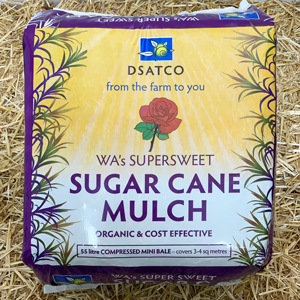 Mulch. Now is the perfect time to get some mulch down on your garden - after we've just had that rain to soak the ground and before we have too many hot days is the perfect opportunity. If your soil is water repellent, a consider incorporating Sand Remedy, Cassies Clay, Charlie Charcoal (or a combination - we're happy to give advice) as these mineral elements are permanent ways to increase the water holding ability of your soil. The Water Corporation recommends using a chunky, coarse mulch ("one that would hurt to walk on with bare feet") at a depth of about 75mm. For vegetable gardens, most people prefer using a straw based mulch (because it's easier to use in regularly maintained gardens, and breaks down to add organic matter to the soil after a season). Talk to us about what your requirements are & we're happy to suggest options. This year, we've got new mulch products instore - 'Who Flung Dung' (a rich, feeder mulch inoculated with beneficial microbes) and the always popular Sugar Cane Mulch - WA grown (pictured right). Pea straw is back in stock (bagged and in bales) and regular straw bales.
Mulch. Now is the perfect time to get some mulch down on your garden - after we've just had that rain to soak the ground and before we have too many hot days is the perfect opportunity. If your soil is water repellent, a consider incorporating Sand Remedy, Cassies Clay, Charlie Charcoal (or a combination - we're happy to give advice) as these mineral elements are permanent ways to increase the water holding ability of your soil. The Water Corporation recommends using a chunky, coarse mulch ("one that would hurt to walk on with bare feet") at a depth of about 75mm. For vegetable gardens, most people prefer using a straw based mulch (because it's easier to use in regularly maintained gardens, and breaks down to add organic matter to the soil after a season). Talk to us about what your requirements are & we're happy to suggest options. This year, we've got new mulch products instore - 'Who Flung Dung' (a rich, feeder mulch inoculated with beneficial microbes) and the always popular Sugar Cane Mulch - WA grown (pictured right). Pea straw is back in stock (bagged and in bales) and regular straw bales..JPG) Thin your stonefruit - it's tough to do, but it means you'll end up with larger and better quality fruit with the ones you leave on the tree.
Thin your stonefruit - it's tough to do, but it means you'll end up with larger and better quality fruit with the ones you leave on the tree..jpg) Hopefully you've got some of your summer cropping vegies in already... if not, grab some healthy seedlings and get them in. Buying seedlings is buying time - you will save yourself 4 - 6 weeks over growing from seed. We've got a lovely range of seedlings in the traditional punnets, but also in individual biodegradable pots. We decided to trial these this Spring - and they've been very popular. It gives you more flexibility over how many of each type of veg you wish to plant, as well as being plastic free! - the pots are planted directly into the ground. Also these tend to be just a bit more advanced than the plants in punnets.
Hopefully you've got some of your summer cropping vegies in already... if not, grab some healthy seedlings and get them in. Buying seedlings is buying time - you will save yourself 4 - 6 weeks over growing from seed. We've got a lovely range of seedlings in the traditional punnets, but also in individual biodegradable pots. We decided to trial these this Spring - and they've been very popular. It gives you more flexibility over how many of each type of veg you wish to plant, as well as being plastic free! - the pots are planted directly into the ground. Also these tend to be just a bit more advanced than the plants in punnets..jpg) Globe artichokes, Asian greens, Basil, Beans (Snake beans are a heat loving variety), Beetroot, Capsicum, Chilli, Carrots, Celery, Choko, Cucumber, Eggplant, Ginger, Leek, Lettuce, Melons, Mint, Parsley, Parsnips, Pumpkin, Radish, Rocket, Rosella, Silverbeet, Spring onion, Squash, Strawberries, Sweet corn, Sweet potato, Tomato, Zucchini.
Globe artichokes, Asian greens, Basil, Beans (Snake beans are a heat loving variety), Beetroot, Capsicum, Chilli, Carrots, Celery, Choko, Cucumber, Eggplant, Ginger, Leek, Lettuce, Melons, Mint, Parsley, Parsnips, Pumpkin, Radish, Rocket, Rosella, Silverbeet, Spring onion, Squash, Strawberries, Sweet corn, Sweet potato, Tomato, Zucchini. 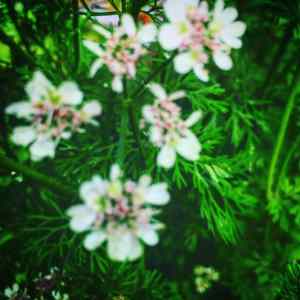 Coriander is a herb that we often enjoy using in summer; but unfortunately it doesn't do well in Perth heat. Ours is now all in flower - which the bees and hoverflies love! If you really want fresh coriander over summer - there are two options. You can grow Mexican or perennial coriander - which is not actually coriander at all; but tastes and smells the same. It is tougher and more adaptable to our summers, providing it gets regular water. Or if you're a pureist and want ONLY traditional coriander; try growing it as a microgreen indoors (or at least in a sheltered spot). You harvest the plants at a very early stage; but they are packed with that pungent coriander aroma and taste that people either love or hate!
Coriander is a herb that we often enjoy using in summer; but unfortunately it doesn't do well in Perth heat. Ours is now all in flower - which the bees and hoverflies love! If you really want fresh coriander over summer - there are two options. You can grow Mexican or perennial coriander - which is not actually coriander at all; but tastes and smells the same. It is tougher and more adaptable to our summers, providing it gets regular water. Or if you're a pureist and want ONLY traditional coriander; try growing it as a microgreen indoors (or at least in a sheltered spot). You harvest the plants at a very early stage; but they are packed with that pungent coriander aroma and taste that people either love or hate!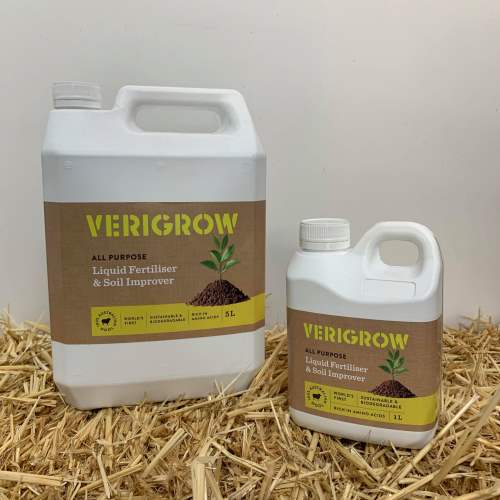 If you're looking for a fertiliser for your seedlings, NEW in store is Verigrow - a WA made liquid fertilser made from low grade wool waste. Verigrow provides nitrogen and amino acids which aid plant health in a number of ways including pest & disease resistance, chlorophyll production (aids photosynthesis), increased root mass, allowing them to withstand harsher conditions.
If you're looking for a fertiliser for your seedlings, NEW in store is Verigrow - a WA made liquid fertilser made from low grade wool waste. Verigrow provides nitrogen and amino acids which aid plant health in a number of ways including pest & disease resistance, chlorophyll production (aids photosynthesis), increased root mass, allowing them to withstand harsher conditions.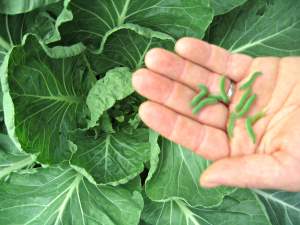 The cabbage butterfly & moth (two different insects!) are around in big numbers still - so it's probably time to decide whether it's worth continuing with your Brassicas now the weather is warming up. If you're wanting to keep crops going, Dipel is the best treatment, then use some insect netting to protect from more eggs being laid on your vegies. Hand pick any caterpillars you can find (they're usually hiding under leaves).
The cabbage butterfly & moth (two different insects!) are around in big numbers still - so it's probably time to decide whether it's worth continuing with your Brassicas now the weather is warming up. If you're wanting to keep crops going, Dipel is the best treatment, then use some insect netting to protect from more eggs being laid on your vegies. Hand pick any caterpillars you can find (they're usually hiding under leaves).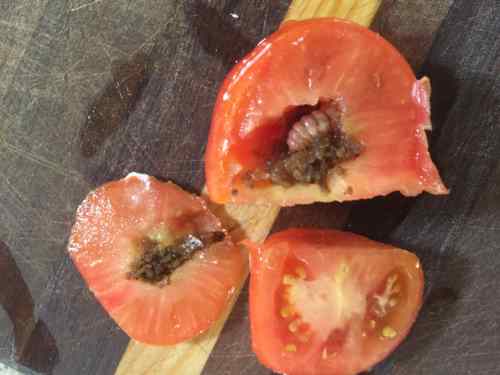 Just when you think the cabbage moth has devastated your winter crops, there's another caterpillar waiting in the wings to feast on your summer ones! These little critters emerge from the soil in spring, and develop into non-descript nocturnal small brown moths. They lay tiny white eggs about the time fruit is JUST forming - on foliage, or usually right at the point that the bud is attached to the plant. As the fruit grows, the eggs hatch, and the caterpillar develops inside the fruit - often you won't know its there until your fruit ripens, and you pick it, and cut it open! It's very disheartening. The best way to get on top of them is to use Dipel - it's a formula based on a natural bacteria that will kill caterpillars, but no other insects, and is safe for mammals. You'll need to spray as flowers are forming and continuing to form (probably weekly). Young caterpillars also feed on foliage - so they're vulnerable to sprays, but once the caterpillar is inside the fruit there's really nothing you can do - so pre-emptive spraying of your plants is the only way to stop this critter once you know they're around. Other options to try would be neem & potassium soap sprays, clay spray and chilli spray - but again regular treatments would be necessary. Insect netting would be effective too - but you'd need to hand pollinate to make sure you get fruit! Crop rotation and digging through soil before and after planting will expose larvae and leave them vulnerable. Natural predators include lacewings and predatory wasps - so encourage biodiversity in your garden! Jackie French also says the adult moths are attracted to light - so perhaps a solar light trap in the vegie patch might be worth a try.
Just when you think the cabbage moth has devastated your winter crops, there's another caterpillar waiting in the wings to feast on your summer ones! These little critters emerge from the soil in spring, and develop into non-descript nocturnal small brown moths. They lay tiny white eggs about the time fruit is JUST forming - on foliage, or usually right at the point that the bud is attached to the plant. As the fruit grows, the eggs hatch, and the caterpillar develops inside the fruit - often you won't know its there until your fruit ripens, and you pick it, and cut it open! It's very disheartening. The best way to get on top of them is to use Dipel - it's a formula based on a natural bacteria that will kill caterpillars, but no other insects, and is safe for mammals. You'll need to spray as flowers are forming and continuing to form (probably weekly). Young caterpillars also feed on foliage - so they're vulnerable to sprays, but once the caterpillar is inside the fruit there's really nothing you can do - so pre-emptive spraying of your plants is the only way to stop this critter once you know they're around. Other options to try would be neem & potassium soap sprays, clay spray and chilli spray - but again regular treatments would be necessary. Insect netting would be effective too - but you'd need to hand pollinate to make sure you get fruit! Crop rotation and digging through soil before and after planting will expose larvae and leave them vulnerable. Natural predators include lacewings and predatory wasps - so encourage biodiversity in your garden! Jackie French also says the adult moths are attracted to light - so perhaps a solar light trap in the vegie patch might be worth a try.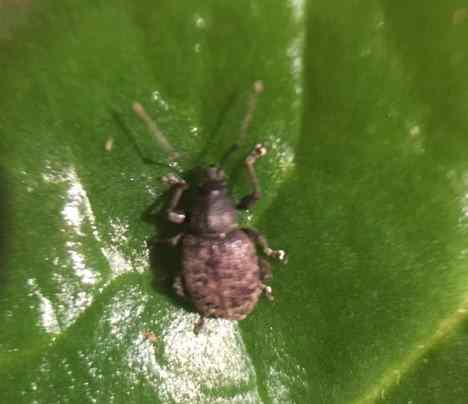
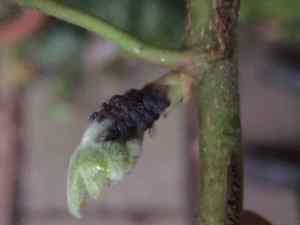 These pests are active now on ornamental and vegetable plants all over Perth. Luckily, adult aphids aren't highly mobile - a jet of water will displace them and most won't find their way back onto your plants. Potassium soap sprays and also eco oil sprays are effective too - providing you make contact with the insect. Try chilli and garlic sprays as a home made deterrent. Here's an article we did on Aphids (and their control) a while back -
These pests are active now on ornamental and vegetable plants all over Perth. Luckily, adult aphids aren't highly mobile - a jet of water will displace them and most won't find their way back onto your plants. Potassium soap sprays and also eco oil sprays are effective too - providing you make contact with the insect. Try chilli and garlic sprays as a home made deterrent. Here's an article we did on Aphids (and their control) a while back - 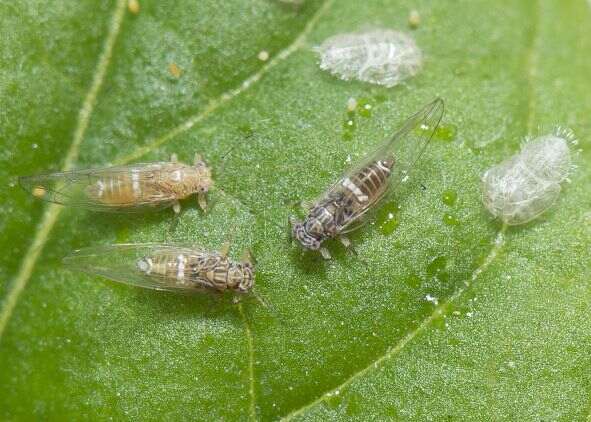 This new pest (found in Perth in the last few years) loves tomatoes, capsicum, eggplant, tamarillos, chilli, sweet potato, goji berries and mint looks a little bit like an aphid - they're tiny flying insects (as adults) and can spread disease in your crops. Use eco oil to help control numbers (you'll need to repeat roughly every 5 days). Sticky traps can also be effective - make sure they've got a protective cover (or fashion your own from wire) to protect small birds who may get stuck on them. (Photo courtesty of the Ag Dept of WA)
This new pest (found in Perth in the last few years) loves tomatoes, capsicum, eggplant, tamarillos, chilli, sweet potato, goji berries and mint looks a little bit like an aphid - they're tiny flying insects (as adults) and can spread disease in your crops. Use eco oil to help control numbers (you'll need to repeat roughly every 5 days). Sticky traps can also be effective - make sure they've got a protective cover (or fashion your own from wire) to protect small birds who may get stuck on them. (Photo courtesty of the Ag Dept of WA) Keep an eye on your fruit trees - this may mean netting against fruit fly now that fruit is forming (and before they soften up), and make sure watering is regular from now on. We sell insect netting in packs @ GLSC - however we ARE out of stock as I write this; more due in soon (we hope!) - pictured right is a close up of the knitted structure of exclusion netting. Other options are traps & lures - Eco-naturalure is Registered Organic fruit fly bait spray for both male and female flies and has no withholding period. It combines specific food-based attractants which target only fruit flies and a bacteria-derived insecticide called spinosad. Fruit flies eat the bait and are killed by the organic insecticide. It's applied as a spot spray in 30cm patches around the foliage of plants (or you can spray it on a board and hang in or near your trees). No need to cover the whole tree or all the fruit. Must be applied weekly and after rain. See our fact sheet here on
Keep an eye on your fruit trees - this may mean netting against fruit fly now that fruit is forming (and before they soften up), and make sure watering is regular from now on. We sell insect netting in packs @ GLSC - however we ARE out of stock as I write this; more due in soon (we hope!) - pictured right is a close up of the knitted structure of exclusion netting. Other options are traps & lures - Eco-naturalure is Registered Organic fruit fly bait spray for both male and female flies and has no withholding period. It combines specific food-based attractants which target only fruit flies and a bacteria-derived insecticide called spinosad. Fruit flies eat the bait and are killed by the organic insecticide. It's applied as a spot spray in 30cm patches around the foliage of plants (or you can spray it on a board and hang in or near your trees). No need to cover the whole tree or all the fruit. Must be applied weekly and after rain. See our fact sheet here on 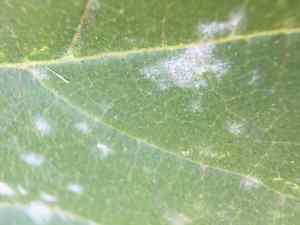 Watch your watering - with cooler nights & mornings, powdery mildew (pictured right) can be a problem with your curcubits (zucchini, cumbers, melons, etc.) as well as grape vines and some ornamental plants. Watering in the morning (instead of the evening) is recommended, as it gives the leaves a chance to dry off as the day warms up. Use a simple spray of 1 part full cream milk to 9 parts water and spray over susceptible leaves. Another option is 1 flat tablespoon of bi-carb, 1 tbspn of vegetable oil, a few drops of dishwashing liquid in 1 litre of water, shake to combine, and spray. Both these methods make the leaf surface less susceptible to fungal growth, and can be applied weekly as a preventative. Ensure good airflow around your plants, and if any leaves are badly infected, remove and bin them, as spores can spread and infect healthy growth. Avoid using when very hot weather is forecast - any spray that contains oil can cause leaf burn in strong sun. Chamomile and Chives are both mildly anti-fungal too - so make tea from the leaves (and flowers with Chamomile) and use as a foliar spray.
Watch your watering - with cooler nights & mornings, powdery mildew (pictured right) can be a problem with your curcubits (zucchini, cumbers, melons, etc.) as well as grape vines and some ornamental plants. Watering in the morning (instead of the evening) is recommended, as it gives the leaves a chance to dry off as the day warms up. Use a simple spray of 1 part full cream milk to 9 parts water and spray over susceptible leaves. Another option is 1 flat tablespoon of bi-carb, 1 tbspn of vegetable oil, a few drops of dishwashing liquid in 1 litre of water, shake to combine, and spray. Both these methods make the leaf surface less susceptible to fungal growth, and can be applied weekly as a preventative. Ensure good airflow around your plants, and if any leaves are badly infected, remove and bin them, as spores can spread and infect healthy growth. Avoid using when very hot weather is forecast - any spray that contains oil can cause leaf burn in strong sun. Chamomile and Chives are both mildly anti-fungal too - so make tea from the leaves (and flowers with Chamomile) and use as a foliar spray.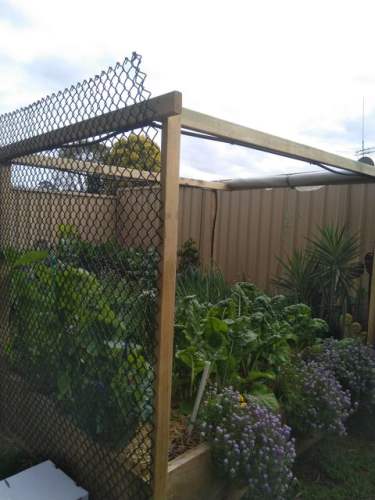
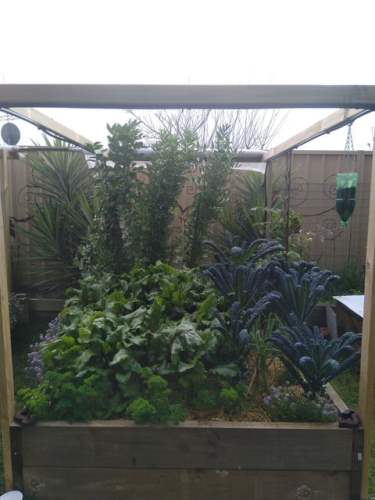
 Christmas is just around the corner!! Come and grab a 2021 Moon Planting Calendar and get a very special deal. Valid up until Christmas, and only while stocks last - when they're gone, they're gone!
Christmas is just around the corner!! Come and grab a 2021 Moon Planting Calendar and get a very special deal. Valid up until Christmas, and only while stocks last - when they're gone, they're gone! Please support your local independent retailer who supports us! The specialist retailers listed here will be happy to give you gardening advice and help you with our products - please call to check what lines they carry. We'd love to welcome the 'newbies'- Urban Revolution, Ardess Nursery and Boyup Brook Co-operative.
Please support your local independent retailer who supports us! The specialist retailers listed here will be happy to give you gardening advice and help you with our products - please call to check what lines they carry. We'd love to welcome the 'newbies'- Urban Revolution, Ardess Nursery and Boyup Brook Co-operative..jpg) Ardess Nursery (Albany) 9842 9952 ** new outlet! **
Ardess Nursery (Albany) 9842 9952 ** new outlet! **




















